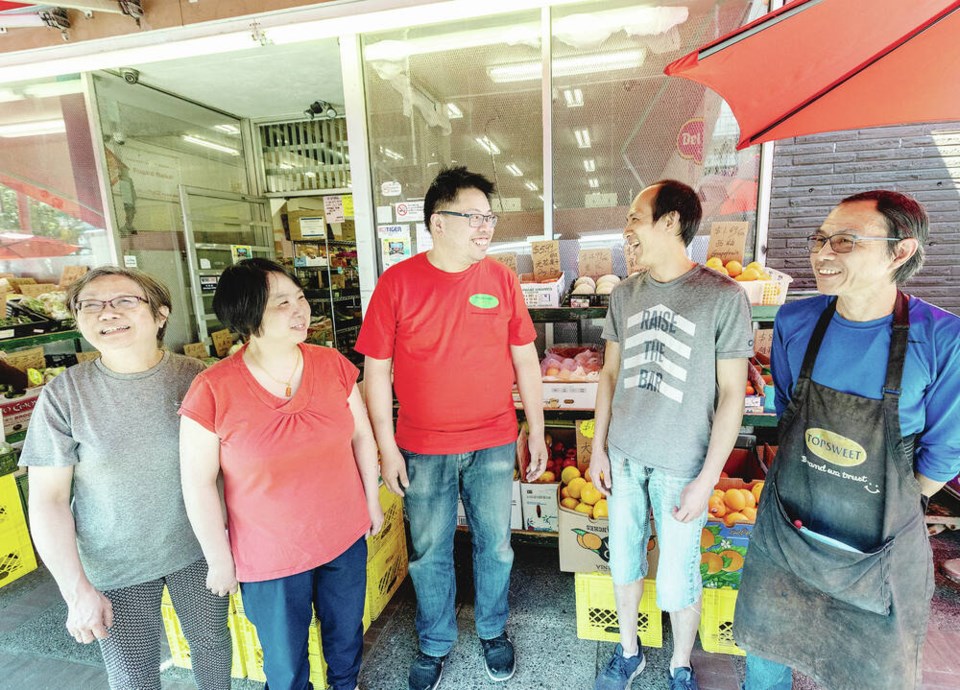The man who built Fisgard Market over the past three decades is stepping away from the Chinatown institution.
Ken Leung has sold the grocery store, which supplies the majority of Asian restaurants in the capital region, to new owners, including long-time Fisgard Market employee Ten Liu and Chinatown restaurateurs Lin Sun and Li Ze Huang of I Kyu Noodles.
While Leung, 47, isn’t retiring just yet, he’s taking a break to make his family the priority, he said. The store will close for the day today for an inventory count, with the new owners taking over on Thursday.
“I basically worked seven days a week, over 10 hours a day for almost 29 years,” Leung said. “My [eldest] son is in Grade 11 right now … basically I have one more year to spend time with him.”
Most of the store’s workers are staying on after the ownership change, with only a few leaving or taking retirement, according to a statement from Fisgard Market.
Hong Kong-born Leung grew up in Vancouver working for his father’s wholesale business, which brought in Asian goods to Victoria.
“His warehouse was actually on Herald street, right behind this building,” Leung said, pointing to a 19th century cold-storage warehouse now converted to apartment and office use.
Seeing a vacant lot on the adjacent street, Leung’s father encouraged him to start a retail grocery store to complement the family’s wholesale operations.
Leung soon found himself running the store with a single employee at the age of 18, a month after he graduated from Sir Winston Churchill Secondary School in 1994.
“It was hard. I knew nothing,” Leung said, adding that he would cry at night after closing the store. “Customers knew my dad — they were whining to my dad that I was doing a s-----y job.”
Leung’s father sold his Vancouver-based wholesale business in 1995 due to complications from arthritis and gave up the warehouse space on Herald street.
But Leung persevered with Fisgard Market, built a customer base, and started hiring more staff, including a cashier, Minji Tong, whom he would eventually marry.
By the turn of the century, with major Victoria Asian restaurant suppliers General Produce shutting down and Pacific Produce moving to Nanaimo, Leung took a leap into wholesale, eventually turning Fisgard Market into the primary supplier for about 100 Asian restaurants in the capital region.
The store even makes weekly deliveries to Duncan. Many restaurants downtown use it as a place to top up when their own supplies run out.
“Basically, we’re doing two kinds of business in one location. That’s why it feels so busy,” Leung said. “We have no back door, so everything is always loaded outside.”
While Fisgard Market customers may be familiar with its sidewalk vegetable displays and the narrow, packed shelves teeming with hard-to-find Asian goods, a winding three-level warehouse — the heart of Fisgard Market’s wholesale operations — sits right behind the retail space, just steps from the frozen dumplings.
Leung gave the Times Colonist a tour of the warehouse, which is about two or three times the size of the retail space. The building is full of Chinatown history. Leung pointed to a boarded-up door in the cellar, which he suspects leads to a tunnel to the harbour, perhaps once used for smuggling or delivery purposes.
On a regular day, Fisgard Market delivers three to five tonnes of meat to up to 60 restaurants all over the capital region, said Ken Wong, a senior employee who started at Fisgard Market nearly 25 years ago as a sidewalk vegetable hawker.
The store receives thrice-weekly shipments from Vancouver, and orders all have to be planned two days in advance, he said.
“This industry is all about putting money up front in a gamble to make more money. More money means more goods — the volume is what makes the profit,” said Wong in Toisin-accented Cantonese. “Usually, you’d have to squeeze in here [with all the goods].”
A trip to Fisgard Market often means having to share the narrow grocery aisles with deliveries coming in and out of the back warehouse, but customers don’t seem to mind the bustle, Leung said. At three spaces long, Fisgard Market’s loading zone is the longest in the city, he said.
For the past week, Leung has been selling off the inventory at a discount and saying goodbye to customers, who have greeted him with hugs, thank you cards, and restaurant invitations.
“They come here, they thank me. Some of them [are] even crying tears in front of me,” he said. “I’m really fortunate.”
Over the years, it has been about an even split between Asian and non-Asian grocery-store customers, said Leung.
While over the years, some customers unhappy about the cost and availability of Chinatown parking have switched to box stores with dedicated parking spots, residents of the new downtown residential buildings have made up for the loss, said Leung.
Leung credits his successes to the support of his wife and his employees.
In recent years, Fisgard Market has had a staff of 25 to 30. It’s always been a mix of languages and nationalities, said Leung, noting the communication barrier between employees was one of the persistent challenges over the decades.
Despite new owners, not much will change at the store, said Liu, who has been working at Fisgard for the past decade. Most of the inventory will be brought back on June 1 and majority shareholders Sun and Huang are expected to be fairly hands off while Liu takes over day-to-day operations as general manager, he said.
“There’s no future [plan] yet — we’ll just keep on running it as it is for a few weeks first,” he said. “We’re taking over, but it’s going to be the same.”
>>> To comment on this article, write a letter to the editor: [email protected]



